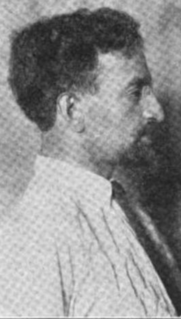A Quote by Ralph Waldo Emerson
In the history of the individual is always an account of his condition, and he knows himself to be a party to his present estate.
Related Quotes
Reason cannot desire for man any condition other than that in which not only every individual enjoys the most absolute, unbounded freedom to develop himself out of himself, in true individuality, but in which physical nature, as well, need receive no other shaping by human hands than that which is given to her voluntarily by each individual, according to the measure of his wants and his inclinations, restricted only by the limits of his energy and his rights.
Solitude is the profoundest fact of the human condition. Man is the only being who knows he is alone, and the only one who seeks out another. His nature - if that word can be used in reference to man, who has ‘invented’ himself by saying ‘no’ to nature - consists in his longing to realize himself in another. Man is nostalgia and a search for communion. Therefore, when he is aware of himself he is aware of his lack of another, that is, of his solitude.
A God who draws near out of love, the Holy Father continued, walks with His people, and this walk comes to an unimaginable point. We could never have imagined that the same Lord would become one of us and walk with us, be present with us, present in His Church, present in the Eucharist, present in His Word, present in the poor, He is present, walking with us. And this is closeness: the shepherd close to his flock, close to his sheep, whom he knows, one by one.
When a person identifies himself with a group his critical faculties are diminished and his passions enhanced by a kind of emotive resonance. The individual is not a killer, the group is, and by identifying with it, the individual becomes one. This is the infernal dialect reflected in man's history.
Strange is the vigour in a brave man's soul. The strength of his spirit and his irresistible power, the greatness of his heart and the height of his condition, his mighty confidence and contempt of danger, his true security and repose in himself, his liberty to dare and do what he pleaseth, his alacrity in the midst of fears, his invincible temper, are advantages which make him master of fortune.
The little individualist, recognizing his individual impotence, realizing that he did not possess within himself even the basis of a moral judgement against his big brother, began to change his point of view. He no longer hoped to right all things by his individual efforts. He turned to the law, to the government, to the state.
The fisherman has a harmless, preoccupied look; he is a kind of vagrant, that nothing fears. He blends himself with the trees and the shadows. All his approaches are gentle and indirect. He times himself to the meandering, soliloquizing stream; he addresses himself to it as a lover to his mistress; he woos it and stays with it till he knows its hidden secrets. Where it deepens his purpose deepens; where it is shallow he is indifferent. He knows how to interpret its every glance and dimple; its beauty haunts him for days.
The autonomous individual, striving to realize himself and prove his worth, has created all that is great in literature, art, music, science and technology. The autonomous individual, also, when he can neither realize himself nor justify his existence by his own efforts, is a breeding call of frustration, and the seed of the convulsions which shake our world to its foundations.
Man... knows only when he is satisfied and when he suffers, and only his sufferings and his satisfactions instruct him concerning himself, teach him what to seek and what to avoid. For the rest, man is a confused creature; he knows not whence he comes or whither he goes, he knows little of the world, and above all, he knows little of himself.
[T]he individual in whom the will for the light is strong and clear finds his heart inextricably bound up with the struggle of the forces of light in his native place and time. Much as he may long for the opportunity of fuller self- expression in a happier world, he knows that for him self-expression is impossible save in the world in which his mind is rooted. The individual in whom the will for the light is weak soon persuades himself that his opportunity lies elsewhere.









































